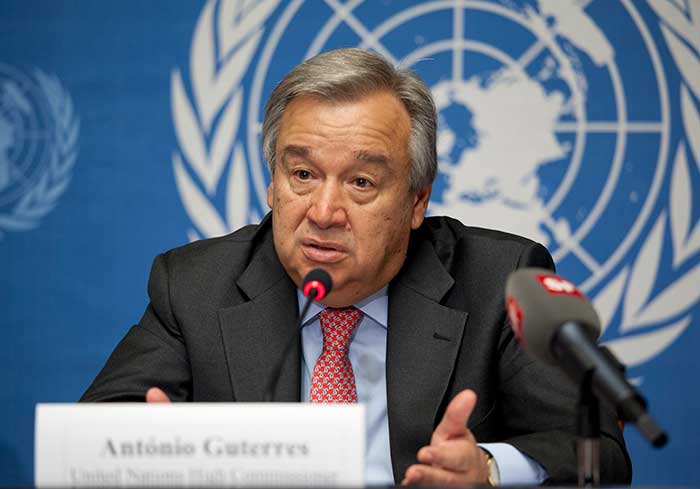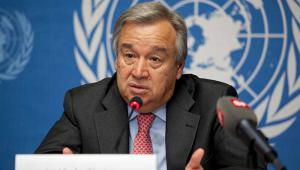In an unexpected turn of events, the 15 ambassadors from the security council emerged from the sixth straw poll yesterday overwhelmingly in favour of Guterres, who led the UN refugee agency for a decade, replacing incumbent Ban Ki-Moon at the beginning of 2017. No one was opposed.
Russia’s UN ambassador, Vitaly Churkin, who was thought to be among the most likely to object to Guterres, described him as the “clear favourite” after the meeting.
“We have decided to go to a formal vote tomorrow morning at 10 o’clock, and we hope it can be done by acclamation.”
The more informal straw poll held yesterday was not expected to produce a winner, and is not an official vote. Members of the 15-strong security council can encourage, discourage or offer no opinion on candidates, while the five permanent members can also veto.
Guterres won 13 votes of support and two abstentions, without a single vote against him. The runner-up, Slovenia’s Miroslav Lajčak, had seven supporting votes and six against him, including two vetoes from permanent members.
His lead on the other candidates is so substantial that, if the two abstentions decide to change their mind in favour of Guterres today, security council members are likely to simply pass a resolution to nominate Guterres by acclamation.
Otherwise, the council may decide to take a formal vote. Either way, once the council has made its nomination, the UN General Assembly will have to officially confirm the candidacy.
In his vision statement, the UN’s next leader outlined the need for a more “holistic approach” to strengthen the nexus between peace and security, sustainable development and human rights.
He said the future of the UN under his leadership would be driven by a willingness to reform as necessary, efforts to foster global coordination and partnerships, a greater focus on prevention, and a push for better human rights compliance, gender equality and respect for humanitarian principles.
The speedy conclusion to the race is the latest surprise in a contest that has been fraught with geopolitical tensions, and was expected to drag on until at least the end of this month.
As a vocal champion of human rights and a westerner, it was thought Guterres would not be favourable to Russia or China, which are opposed to a candidate with either of those attributes in the UN’s top job.
There was also strong demand for a woman to take the helm of the organisation for the first time in its 70-year history.
The UN’s climate chief, Christiana Figueres, described the result as “bitter sweet”, while others were stronger in their disapproval.
Bittersweet results #NextSG. Bitter: not a woman. Sweet: by far the best man in the race. Congrats Antonio Guterres! We are all with you.
— Christiana Figueres (@CFigueres) 5 October 2016
Anyone surprised @UN is going for another white male?
— Alice Stollmeyer (@StollmeyerEU) 5 October 2016
Well done, #UNSC. Still stuck in 20th Century.#WomanSG #She4SG @She4SG #NextSG pic.twitter.com/1tij8wxtsn
Here are some other opinions on the outcome, tweeted out by Guterres' fellow candidates and other figures.
Congratulations Antonio #Guterres. Clear winner in selection for #NextSG. A longtime colleague: we were Prime Ministers & UN heads together: https://t.co/8FYcXRaYfP
— Helen Clark (@HelenClarkUNDP) 5 October 2016
Just congratulated Antonio #Guterres #NextSG #UN. A good friend, man of vision, heart and action. EU-UN cooperation will grow even stronger
— Federica Mogherini (@FedericaMog) 5 October 2016
UN Security Council will recommend Antonio Guterres as #nextSG. Good news for @UN and the world, says Norway's PM @erna_solberg https://t.co/5gl3P18Azk
— NorwayUN (@NorwayUN) 5 October 2016
Congratulations to #Guterres as #NextSG. Excited he was unequivocal in support for our calls when we met recently pic.twitter.com/CCcxo0qJLh
— Salil Shetty (@SalilShetty) 5 October 2016
Warm congratulations #Antonio_Guterres #NextSG: longstanding & committed leader to @UN principles #SDGs #Peace #HumanRights & equality
— Alicia Bárcena (@aliciabarcena) 6 October 2016
My most sincere congratulations to #Antonio_Guterres! More than confident that he will be an excellent #NextSG!
— Irina Bokova (@IrinaForUN) 5 October 2016
One conclusion: #Helen4SG lost because #NZ is very far from #Europe. If she was an EU national we would be celebrating today. #NextSG pic.twitter.com/B7dgVHywXO
— Mohammed Omer (@Mogaza) 6 October 2016
#Koenders: 'Guterres is decisive and experienced leader, looking forward to cooperation @UN. My warm congratulations!' #NextSG #UNSG @NLatUN
— MFA The Netherlands (@DutchMFA) 5 October 2016














